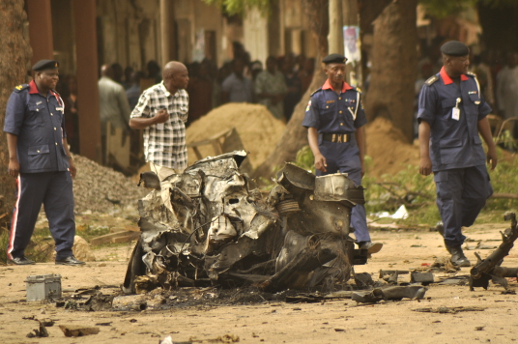
At least five people were killed May 18 by a bomb blast in the Christian district of Kano, in Northern Nigeria.
That attack was followed by an even more deadly one on May 20, when two bomb explosions rocked the city of Jos, in Nigeria’s heartland. Two bomb blasts were reported, one in a cargo truck and the other on a minibus, within minutes of each other. Early casualty reports, none yet confirmed, ran as high as 118 killed.
The May 18 attacker in Kano triggered the suicide bomb at about 9:30 p.m. in the Sabon Gari area of Kano, the capital of the Nigerian state of the same name. Local residents and witnesses said they heard a loud explosion, followed by sounds of chaos.
Kano State Commissioner of Police, Aderenle Shinaba, said three men, a 12-year-old girl, and the bomber were killed by the blast.
Seven people were injured, four of whom have been treated and released.
The police tally of fatalities is contested by local media, which have reported between 10 and 25 killed in the attack. Conflicting reports over the number of victims is frequent in Nigeria, as security authorities tend to report lower numbers of casualties.
The blast, which occurred as dozens of people attended the opening ceremony of a new hotel, could have been even more deadly. But the bomb, placed in a car, exploded too far from the crowd to cause greater casualties.
No group has claimed the responsibility for the Kano or Jos attacks, but they bear the hallmarks of the violent Islamic sect Boko Haram, responsible of the abduction of more than 200 school girls in Chibok in April.
‘‘This is another attack targeting Christians because the majority of people living in Sabon Gari are Christians. Any attack in this busy area will hit members of Christian community,’’ a Church leader, who asked not to be named out of concern for his safety, told Watch Monitor.
Sabon Gari is a Christian enclave within Kano, the commercial nerve centre of northern Nigeria, a mainly Muslim region. It has been the target of several Boko Haram attacks.
In July 2013, at least 12 people were killed in multiple explosions. Three months earlier, suicide blasts at a bus station in the same district claimed at least 25 lives and injured 60. The bus station is primarily used by passengers heading for the mostly Christian South of the country.
Sabon Gari symbolised a sanctuary of liberty for all those – Christians, moderate Muslims and foreigners – who feel oppressed by Sharia (the Islamic Law), adopted in 2000 amidst of a wave of radicalisation of Islam within 12 northern states of Nigeria.
Unlike other areas of Kano, the Sabon Gari district has a large number of churches, along with shops, restaurants, hotels — as well as bars and brothels. That last attraction has made the area particularly irksome to the Hisbah, or Islamic police, whose activism in enforcing Islamic principles has made headlines. In November the Hisbah smashed nearly a quarter-million beer bottles in a public ceremony, as part of a crackdown against “immoral” behavior. In April it staged a mass wedding of 1,000 couples to reduce the state’s “marital problem.”
The Sunday-night bomb attack in Kano came a day after President Goodluck Jonathan, along with leaders of neighbouring Chad, Cameroon, Niger and Benin, pledged during a meeting in Paris to step up cooperation to target the Boko Haram insurgency. The United States, United Kingdom and the European Union have pledged technical assistance.
Boko Haram’s five-year campaign to impose Islamic law in Nigeria has led to thousands of deaths. Its attacks have spread from the Northeast stronghold of Borno State to central Nigeria. Dozens were killed in two separate bombs blast on the outskirts of the capital Abuja in recent weeks. Some analysts have said the group is behind deadly attacks carried out by ethnic Fulani herdsmen in the states of Plateau, Kaduna and Taraba in recent months.
Boko Haram is suspected of taking its campaign beyond Nigeria on May 17 when it attacked the town of Waza, about 15 kilometres inside Cameroon. Ten Chinese engineers were kidnapped, and a Cameroon solider was killed.
On Monday, May 19, as life in Sabon Gari attempted to return to normal, police in Kano said they had averted “another devastating bomb blast” by neutralising a Mitsubishi station wagon loaded with explosives.